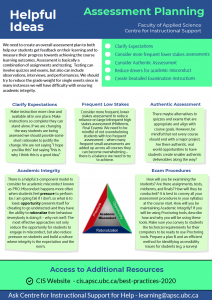Assessment is often a combination of assignments and testing.

Assessment Planning
Pete Ostafichuk has written an extensive assessment guide as part of the ECORE initiative.
Please contact me to schedule a 1-to-1 consultation where we can review your current assessment processes and brainstorm good alternatives that will work we online (email me jim.sibley@ubc.ca)
Spend some time refining your assignments instructions to ensure they stand alone well.
Consider building rubrics to aid in assessment and aid students in the completion of their assignments.
When we move testing online we need to realize that there is an increased opportunity for cheating. The literature about cheating online is sobering – with up to 40% of students indicating they have cheated on an online test. This doesn’t mean 40% of students cheated on the last test but it does mean this is a problem that should be carefully managed. There are generally two ways to address this issue. We can divide assessments into many smaller chunks and not rely on single traditional high stakes examination that is worth a considerable portion of the total course grade. Having tests and assignments more often, for fewer marks. This can partially address these issues, but both solutions are imperfect. Many small assessments added up across multiple courses can be a bit overwhelming for students.
Low Stakes Assessment Options
Here are a few low stakes assessment options. We normally build these assessments to minimize marking loads. They are often just for completion marks (Minute Papers, Exam Question Writing) or are automatically graded (retrieval quizzes and WeBWork).
- Minute Papers (use TA to review submissions – to extract thematic insights and issues)
- Retrieval Quizzes
- Student Exam Question Writing
- WeBWork
High Stakes Assessment Options
- MCQ tests and exams
- Handwritten exams
- Lock Down Browsers
- Zoom Invigilation
Other Options
- Peer Review (Canvas + Peer Scholar)
- Peer Evaluation (iPeer)
- Summaries and other written work (supported with Turn-It-In)
- Student created questions and matching solution
- Online Presentation options (live or recorded)
- Articulate/SCORM videos
Other Strategies to consider – lets talk
- MCQ writing
- High-level MCQ writing
- Tools to support and assess online team collaboration
- Rubrics
- Specification Grading
- Marking only some policy
- Pass/fail grading
- Rethinking how we use TA’s


